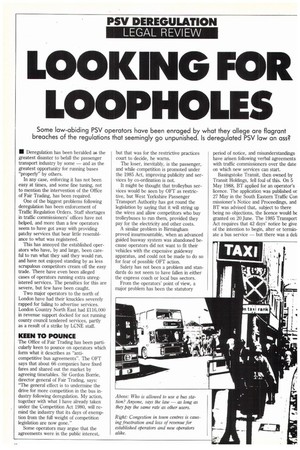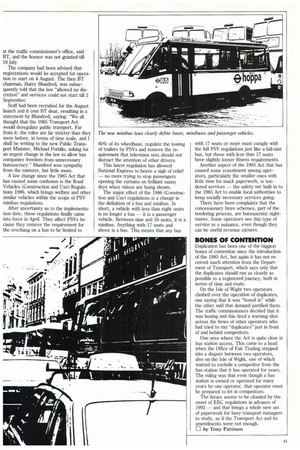LOOKING FOR LOOPHOLES
Page 32

Page 33

If you've noticed an error in this article please click here to report it so we can fix it.
Some law-abiding PSV operators have been enraged by what they allege are flagrant breaches of the regulations that seemingly go unpunished. Is deregulated PSV law an ass?
• Deregulation has been heralded as the greatest disaster to befall the passenger transport industry by some — and as the greatest opportunity for running buses "properly" by others.
In any case, enforcing it has not been easy at times, and some fine tuning, not to mention the intervention of the Office of Fair Trading, has been required.
One of the biggest problems following deregulation has been enforcement of Traffic Regulation Orders. Staff shortages in traffic commissioners' offices have not helped, and more than a few operators seem to have got away with providing patchy services that bear little resemblance to what was registered.
This has annoyed the established operators who have, by and large, been careful to run what they said they would run, and have not enjoyed standing by as less scrupulous competitors cream off the easy trade. There have even been alleged cases of operators running extra unregistered services. The penalties for this are severe, but few have been caught.
Two major operators to the north of London have had their knuckles severely rapped for failing to advertise services. London Country North East had £116,000 in revenue support docked for not running county council tendered services, partly as a result of a strike by LCNE staff.
KEEN TO POUNCE
The Office of Fair Trading has been particularly keen to pounce on operators which form what it describes as "anticompetitive bus agreements". The OFT says that about 66 companies have fixed fares and shared out the market by agreeing timetables. Sir Gordon Borne, director general of Fair Trading, says: "The general effect is to undermine the drive for more competition in the bus industry following deregulation. My action, together with what I have already taken under the Competition Act 1980, will remind the industry that its days of exemption from the full weight of competition legislation are now gone."
Some operators may argue that the agreements were in the public interest, but that was for the restrictive practices court to decide, he warns.
The loser, inevitably, is the passenger, and while competition is promoted under the 1985 Act, improving publicity and services by co-ordination is not.
It might be thbught that trolleybus services would be seen by OFT as restrictive, but West Yorkshire Passenger Transport Authority has got round the legislation by saying that it will string up the wires and allow competitors who buy trolleybuses to run them, provided they pay for the electricity and other costs.
A similar problem in Birmingham proved insurmountable, when an advanced guided busway system was abandoned because operators did not want to fit their vehicles with the expensive guideway apparatus, and could not be made to do so for fear of possible OFT action.
Safety has not been a problem and standards do not seem to have fallen in either the express coach or local bus sectors.
From the operators' point of view, a major problem has been the statutory period of notice, and misunderstandings have arisen following verbal agreements with traffic commissioners over the date on which new services can start.
Basingstoke Transit, then owned by Transit Holdings, fell foul of this. On 5 May 1988, BT applied for an operator's licence. The application was published or 27 May in the South Eastern Traffic Con missioner's Notice and Proceedings, and BT was advised that, subject to there being no objections, the licence would be granted on 20 June. The 1985 Transport Act requires that 42 days' notice be give of the intention to begin, alter or terminate a bus service — but there was a dell at the traffic commissioner's office, said BT, and the licence was not grunted till 18 July.
The company had been advised that registrations would be accepted for operation to start on 4 August. The then BT chairman, Harry Blundred, was subsequently told that the law "allowed no discretion" and services could not start till 2 September.
Staff had been recruited for the August launch and it cost BT dear, resulting in a statement by Blundred, saying: "We all thought that the 1985 Transport Act would deregulate public transport. Far from it; the rules are far stricter than they were before, in terms of time scale, and I shall be writing to the new Public Transport Minister, Michael Portillo, asking for an urgent change in the law to allow bus companies freedom from unnecessary bureaucracy." Blundred won sympathy from the minister, but little more.
A law change since the 1985 Act that has caused some confusion is the Road Vehicles (Construction and Use) Regulations 1986, which brings welfare and other similar vehicles within the scope of PSV minibus regulations.
After uncertainty as to the implementation date, these regulations finally came into force in April. They affect PSVs because they remove the requirement for the overhang on a bus to be limited to 60% of its wheelbase, regulate the towing of trailers by PSVs and remove the requirement that television sets should not distract the attention of other drivers.
This latest regulation has allowed National Express to heave a sigh of relief — no more trying to stop passengers opening the curtains on brilliant sunny days when videos are being shown.
The major effect of the 1986 (Construction and Use) regulations is a change in the definition of a bus and minibus. In short, a vehicle with less than eight seats is no longer a bus — it is a passenger vehicle. Between nine and 16 seats, it is a minibus. Anything with 17 seats and above is a bus. This means that any bus
with 17 seats or more must comply with the full PSV regulations just like a full-size bus, but those with less than 17 seats have slightly looser fitness requirements.
Another aspect of the 1985 Act that has caused some resentment among operators, particularly the smaller ones with little time for much paperwork, is ten dered services the safety net built in to the 1985 Act to enable local authorities to keep socially necessary services going.
There have been complaints that the concessionary fares schemes, part of the tendering process, are bureaucratic nightmares. Some operators see this type of service as a nuisance, even though they can be useful revenue earners.
BONES OF CONTENTION
Duplication has been one of the biggest bones of contention since the introduction of the 1985 Act, but again it has not received much attention from the Department of Transport, which says only that the duplicates should run as closely as possible to a registered journey, both in terms of time and route.
On the Isle of Wight two operators clashed over the operation of duplicates, one saying that it was "boxed in" while the other said that demand justified them. The traffic commissioners decided that it was boxing and this fired a warning shot across the bows of other operators who had tried to run "duplicates" just in front of and behind competitors.
One area where the Act is quite clear is bus station access. This came to a head when the Office of Fair Trading stepped into a dispute between two operators, also on the Isle of Wight, one of which wanted to exclude a competitor from the bus station that it has operated for years. The ruling was that even though a bus station is owned or operated for many years by one operator, that operator must be prepared to let in competitors.
The future seems to be clouded by the onset of EEC regulations in advance of 1992 — and that brings a whole new set of paperwork for busy transport managers to study, as if the Transport Act and its amendments were not enough.
0 by Tony Pattison


























































